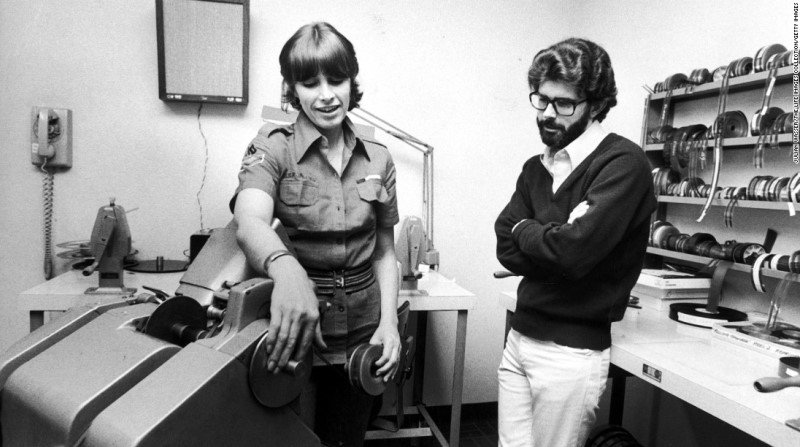Women of Star Wars: Marcia Lucas
 Undoubtedly, George Lucas was an innovator and visionary. But imagine if the 1977 Star Wars had just been cool effects? Imagine if people hadn’t cared as much for the characters? Imagine if everyone. including Obi-Wan, had escaped the Death Star with ease? Or if the final battle hadn’t delivered that perfect denouement? Then you’d have to imagine a world without Marcia Lucas.
Undoubtedly, George Lucas was an innovator and visionary. But imagine if the 1977 Star Wars had just been cool effects? Imagine if people hadn’t cared as much for the characters? Imagine if everyone. including Obi-Wan, had escaped the Death Star with ease? Or if the final battle hadn’t delivered that perfect denouement? Then you’d have to imagine a world without Marcia Lucas.
Despite her role in the creation of Star Wars, official material has been woefully thin on her involvement. A combination of bad feelings following her divorce from George Lucas, our cultural propensity to elevate men and minimize the efforts of women, and the passage of time have blurred Marcia Lucas’ contributions to Star Wars – or even remembering that she was highly respected film editor in her own right. Her life story for some women represents the eternal struggle between career and family. Ultimately both Marcia’s, and later George’s, separations from Star Wars came down to wanting to spend more time on family.
Lucas had re-configured much of The Star Wars for his second draft, completed in January of 1975. He had finally come up with the basic backbone of the film–the heroic journey of farmboy Luke Starkiller–but his characterisation and dialogue were arguably even worse than his first draft. Lucas, however, acknowledged that he was a poor writer, and sought the guidance of others. “I’m not a good writer,” he says in 1974. “It’s very, very hard for me. I don’t feel I have a natural talent for it… When I sit down I bleed on the page, and it’s just awful.” He had attempted to hire writers for every one of his previous films, but experience taught him a different technique–he would listen to the suggestions others had, but write the words himself. Marcia, along with many of George’s friends, critiqued which characters worked, which ones didn’t, which scenes were good, and Lucas composed the script in this way. Marcia was always critical of Star Wars, but she was one of the few people Lucas listened to carefully, knowing she had a skill for carving out strong characters. Often, she was a voice of reason, giving him the bad news he secretly suspected–”I’m real hard,” she says, “but I only tell him what he already knows.” Pollock notes, “Marcia’s faith never waivered–she was at once George’s most severe critic and most ardent supporter. She wasn’t afraid to say she didn’t understand something in Star Wars or to point out the sections that bored her.” She kept her husband down to earth and reminded him of the need to have an emotional through-line in the film. Mark Hamill remembers: “She was really the warmth and heart of those films, a good person he could talk to, bounce ideas off of.”
From “The Secret History of Star Wars” (footnotes omitted)
For years, the Secret History of Star Wars was the best resource on Marcia Lucas’ contributions to the franchise. Recently, my fellow Fangirls Going Rogue co-host Sarah Woloski pointed me to a 30-minute podcast episode of The Jedi Beat that does a great job of telling the story of Marcia Lucas. It includes some really interesting insights into the early years of George Lucas’ career, too. The most important takeaway is that in addition to enabling her husband, Marcia Lucas also served as the all-important critical eye that many have felt was lacking in the years beyond the Original Trilogy.
The Jedi Beat is written, narrated, and produced by Jennifer Landa, one of my all-time favorite Star Wars fangirls. Her positive contributions to fandom are numerous. She has fun, such as her tongue-in-cheek look at fake geek girls a few years ago at San Diego Comic-Con, but her message is almost always centered on empowering the broad base of diverse fans. The Jedi Beat is part of Force Center podcast.
For more on Marcia Lucas, check out The Jedi Beat #9: The Woman Behind The Success of Star Wars.
Follow Jennifer Landa on Twitter.
Image: CNN
- Hyperspace Theories: Bad Luck Ghorman - June 2, 2025
- Hyperspace Theories: One Year Later as ANDOR Kicks Off Season Two - May 15, 2025
- REVIEW: Tales of the Underworld - May 4, 2025









